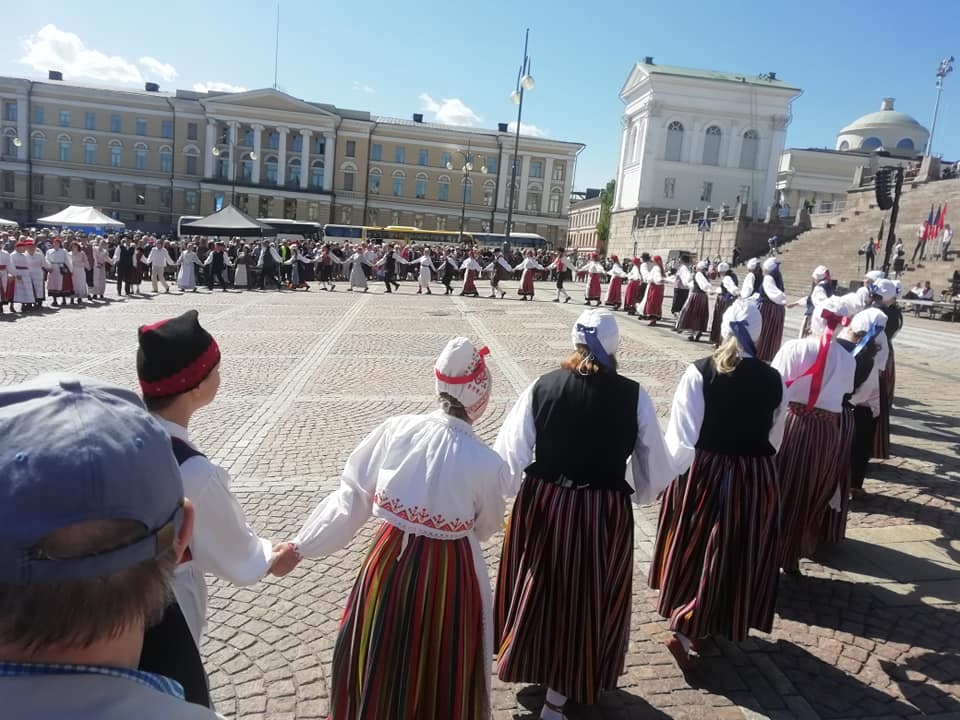Finland-based Estonian expat Maris Vaher shares her thoughts on the challenges of keeping her children’s ties with the Estonian identity, culture and language.
How do you preserve Estonian culture and the national identity when living and working abroad? How can you set important things straight for yourself and your children while living outside the border? I share my thoughts with you. I have noticed: while living abroad, we forget to keep our children’s ties with Estonia.
An Estonian expat in Finland
I have always been involved in a variety of activities, have had many hobbies and enjoyed working in teams. I simply enjoy organising and taking part in different processes. I coordinated the opening concert of ESTO 2019 cultural festival on 28 June 2019 in Helsinki and find myself very fortunate to have been part of the ESTO 2019 committee.

I was born in Estonia’s Jõgeva county and grew up in the small village of Ulvi near Avinurme. I spent nine years at a small village school, heated with a wood-burning stove, and graduated from Jõgeva Upper Secondary School with a focus in humanities. I have a diploma from the University of Tartu Viljandi Culture Academy as a hobbyist and creative activity teacher, with a specialisation in teaching drama. After university, I worked as a kindergarten teacher, led a drama circle and worked as a social pedagogue at the Kaagvere school for girls with special needs.
In January 2012, I moved to Helsinki with my daughter, where my fiancé worked at the time. I moved because I believed a family couldn’t be united while living in different countries. Before I became a mother, I had taken care of other children and primarily lived outside our home. When we had our second child, my focus moved to home and family, but I found myself alone in a foreign country, speaking a foreign language. Although I had my family and my home, everything else remained in Estonia, and, as our younger child grew older, I had time to go out and do my own thing a few nights a week.
I started taking Finnish lessons at the Helsinki Estonian House and wanted to get involved in activities with other Estonians, since I missed being among my “own kind”. So, I took up various hobbies, played sports, and was introduced to the local Estonian cultural societies. Finally, I managed to get into a year-long Finnish language course that opened the door to Helsinki’s cultural houses.
I met people in my field, worked as a part of international teams and found opportunities to start my own specialty work. I would not have been satisfied with any less. That had been my goal when I left home. However, my entire future had to be built from scratch. I found it very difficult. I felt like a child; first learning to speak the language, then getting to know local customs, familiarising myself with the new and the foreign, and the citizens of this new country. Yet, my goal remained to find a job.
In Finnish schools, there are no activity leaders, so I had to find a different application for my degree. In 2015, I started to work in various Estonian societies – I sang in the mixed choir “Siller”, was a member of the theatre group, danced in the mixed folkdance group, “Ülelahedad”, and started singing in the European Choir of Estonians. Additionally, I belong to the Estonian language education society.
Worrying about children’s Estonian identity
Estonia will always be my home; however, my children have grown up in Finland, attending the kindergartens here, so I became fearful that they would not be exposed to aspects of Estonian culture that I hold so dear. I worried they could not speak Estonian well enough, that they would write poorly and that they would not know the customs, culture or places of my country of birth.
While we speak Estonian at home, that is not sufficient to maintain adequate proficiency when our everyday language of work or play is a foreign language. I read, speak and teach within my language ability, but a new, specific vocabulary pertaining to music and math is embedded in my students in a foreign language.
This encouraged me to look for opportunities to engage in Estonian-language hobby education. I have run children’s circles in Estonian, worked as a substitute teacher for Estonian language classes at Helsinki’s Latokartano Elementary School and been involved in projects related to Estonian culture and education.

Hence, I came across the family club, Sipsik. I attended as a guest at first, but one day they offered me a job as their song and game instructor. Of course, I accepted their offer and soon became the director of the entire family club. I am working there for the fourth year now.
The family club is run out of Alppila Church, where cantor Dagmar Õunap leads Estonian congregational work in Helsinki. Together, we have built a family club where every second Saturday, Estonian families gather to do crafts, sing, dance, play sports and interact. For the thirteenth year, the season will be capped off with a spring family camp.

This is a very popular way to get in touch with your family. Children meet new friends, families spend time together in an engaging setting and communicate with each other in Estonian while learning Estonian customs, songs and dances together. Over the past few years we have had an attendance of nearly fifty people.
I find Sipsik meeting hours to be recharging. It rarely feels like work, it is simply something I love doing. Here I can be with enthusiastic, active people and together we bring smiles to children’s faces. Altogether, I gain much more from this than I give.
Why am I talking about all of this?
Despite the many opportunities present in Finland to learn Estonian, the reality is that learning a language is not that easy – not to mention maintaining it. This is where the family can play an important roll; however, many families living abroad have not realised just how important every opportunity for children to express themselves in their mother tongue is.
It is said that the Finnish language is very similar to Estonian, but actually, it is quite different. Furthermore, it is said that our cultures are closer than those of other countries Estonians have moved to; however, this only enables parents and children to speak a misunderstood jumble of two languages. People blindly believe that since they are able to get by, so will their children. Unfortunately, that comparison cannot be drawn because we were already adults when we moved countries.

Our primary education was completed in Estonian, we speak proper Estonian and we were exposed to the cultural space. Hence, the ties adults feel to Estonia are much stronger, while these have not been given a chance to develop in children born abroad. Since birth, their home has been Finland.
Who are we then? What is your background and what language do I speak? These are questions of identity that children can use to define themselves. Not to mention, the basis for being proficient in the language, which can open doors in the future.
Hold onto our ties with Estonia
If the child does not have “one of ours” recognition, ultimately, they lack a certain assurance. At least that is my opinion, which motivates me to keep doors open for my children that connect them to Estonia. We never know when our children may want to go live or study in Estonia. It is easier to return for university where English is the prevalent language. To attend high school in Estonia, the student must be highly proficient, or they will not be able to understand the content and acquire the required knowledge.
Let us continue to read Estonian literature, watch Estonian films and listen to quality Estonian music to hold onto our ties with Estonia. This provides exposure to a vocabulary that is not needed when discussing day to day events at the dinner table. Finally, a restricted vocabulary can close some doors completely.
It is worth keeping in mind how difficult it was for us to arrive in a foreign country and what had to be done to learn the language, find a job – that you actually wanted to go to – and how you met your first local friend. If our children should decide to move to Estonia in ten years, they will be in a similar situation. They are not ordinary Estonians – they are Estonians from abroad. It is important to contemplate these topics.
Although we live abroad, Estonia remains in our lives, our souls and our hearts! And it must be held there, always.
The opinions in this article are those of the author. Cover: Maris Vaher.

